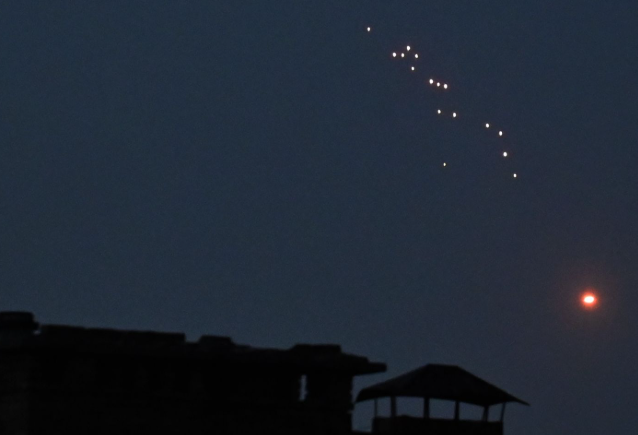Best Free Resources for Traders in 2025: From Charts to AI Alerts
December 01 , 2025

Poland has scrambled fighter jets in response to a massive Russian assault on Ukraine, heightening tensions in Eastern Europe. This escalating conflict underscores the region’s geopolitical volatility and the urgent need for international attention and support.
In a dramatic escalation of the ongoing conflict in Eastern Europe, Poland has scrambled its fighter jets following a massive assault by Russian forces on Ukraine. The sudden military activity has raised alarm across NATO countries and the international community, highlighting the region's fragile security situation. The ongoing Russian offensive has led to significant casualties and destruction, prompting neighboring countries to prepare for potential spillover effects.
Russia launched a large-scale attack on multiple fronts in Ukraine, targeting key military installations, infrastructure, and strategic cities. Satellite imagery and battlefield reports indicate that Russian forces employed heavy artillery, missile strikes, and coordinated ground attacks aimed at overwhelming Ukrainian defenses. Civilians in affected areas have been urged to evacuate, while international organizations scramble to provide humanitarian aid.
Ukrainian officials have condemned the assault as a blatant violation of international law, calling for immediate support from Western allies. President Volodymyr Zelenskyy emphasized that Ukraine is prepared to defend its sovereignty but requires increased military and logistical assistance to repel Russian advances.
Poland, sharing a long border with Ukraine, reacted swiftly by scrambling fighter jets to monitor airspace and deter potential incursions. The Polish Air Force has increased readiness levels at multiple bases and is conducting aerial patrols along its eastern borders. Authorities have also placed ground forces on high alert, coordinating closely with NATO for rapid response if the conflict escalates further.
Polish Prime Minister Mateusz Morawiecki issued a statement expressing solidarity with Ukraine and emphasizing the importance of regional security. He called on NATO members to strengthen defensive measures in Eastern Europe and warned that any expansion of the conflict into neighboring territories would be met with a strong response.
The massive Russian assault on Ukraine has triggered urgent consultations among NATO member states. Military planners are reviewing troop deployments, air defense systems, and reinforcement strategies to protect member nations bordering Ukraine. NATO Secretary-General Jens Stoltenberg has condemned the Russian attacks and reiterated the alliance’s commitment to collective defense under Article 5 if the conflict threatens member countries.
Diplomatic efforts are ongoing to de-escalate tensions. The United Nations has called for an immediate ceasefire and urged both Russia and Ukraine to return to negotiations. Western nations, including the United States, Germany, and the United Kingdom, have pledged additional military aid and sanctions to support Ukraine and deter further Russian aggression.
The assault has already resulted in substantial civilian casualties and widespread displacement. Hospitals are overwhelmed with injured civilians, and critical infrastructure, including power grids and water supply systems, has been damaged or destroyed. Aid organizations are mobilizing emergency relief operations, but the scale of the attack has made it difficult to reach affected populations safely.
International agencies warn that prolonged fighting could lead to a full-scale humanitarian crisis, with millions of people requiring urgent assistance. Humanitarian corridors are being negotiated to facilitate evacuations, but ongoing shelling and airstrikes complicate safe passage for civilians.
The escalation has significant implications for regional security in Eastern Europe. Poland’s rapid mobilization reflects broader concerns that the conflict could spill over into neighboring countries. Border security has been intensified, and air defense systems are on high alert to detect and respond to any potential threats from Russian aircraft or missiles.
Neighboring countries, including Lithuania, Latvia, and Estonia, have also increased military readiness, calling for NATO support to prevent further destabilization. Analysts warn that unchecked Russian aggression could destabilize the entire region, potentially sparking a wider military confrontation.
In response to the assault, Western governments have imposed new rounds of economic sanctions targeting Russian industries, financial institutions, and key government officials. The aim is to pressure Moscow to cease military operations while minimizing the humanitarian impact on Ukrainian civilians. These sanctions include restrictions on oil and gas exports, technology transfers, and international financial transactions.
Global leaders have also called for unity among NATO countries to present a cohesive deterrence strategy. Diplomatic channels are being leveraged to de-escalate tensions, while military planning continues to ensure rapid intervention if necessary. The international community remains vigilant, closely monitoring developments along the Poland-Ukraine border and other sensitive areas.
Military experts have highlighted several strategic aspects of the Russian assault. Analysts note the use of combined arms tactics, including armored divisions, artillery, and air support, designed to overwhelm Ukrainian defenses. The intensity and coordination of the attacks suggest a long-term strategic objective rather than a limited operation.
Poland’s response, including the deployment of fighter jets, reflects the importance of maintaining air superiority and surveillance along its border. NATO forces are analyzing potential scenarios for escalation and preparing contingency plans to protect both military personnel and civilian populations in bordering states.
The massive Russian assault on Ukraine and Poland’s immediate response underscore the heightened volatility in Eastern Europe. With Poland scrambling jets and NATO closely monitoring the situation, the risk of regional escalation remains high. International attention, military preparedness, and diplomatic efforts are all critical to preventing the conflict from spreading further. As the situation evolves, the global community must remain vigilant and united in supporting Ukraine while maintaining regional stability.